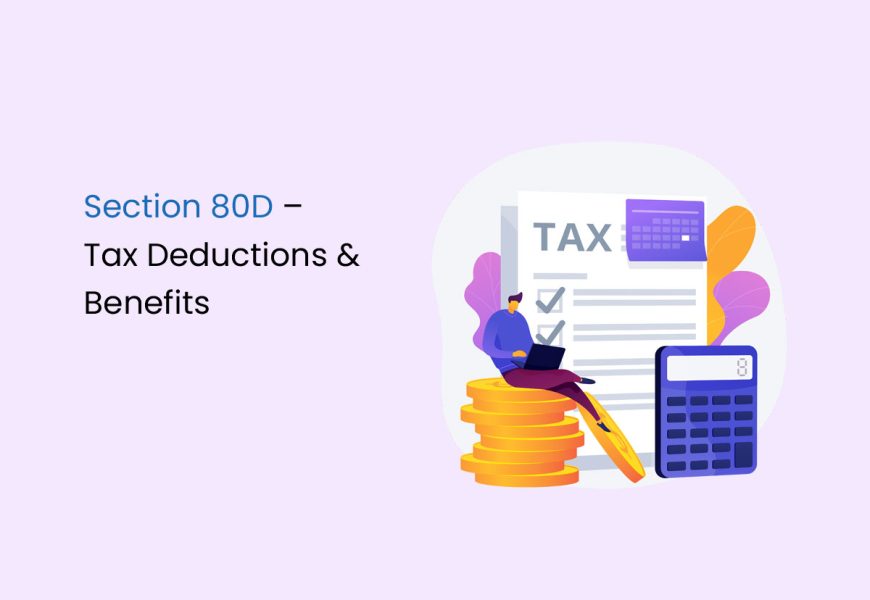Safeguarding your financial stability from unanticipated medical expenses is of great importance. In India, a significant number of individuals deplete their life savings to cover medical bills, often leading to financial hardships. Recognising the need for a solution, the government has introduced tax incentives under Section 80D of the Income Tax Act 1961, encouraging individuals to invest in health insurance policies. In our upcoming article, we provide a comprehensive analysis of Section 80D, empowering you to make well-informed decisions regarding your healthcare coverage and financial security.
What is Section 80D?
Section 80D of the Income Tax Act of 1961 gives taxpayers with the opportunity to avail tax deductions on health insurance premiums paid during a financial year. Under this provision, individuals can claim deductions of up to Rs 25,000 towards health insurance premiums paid for themselves, their spouses, dependent children, and parents. For senior citizens (60 years and above), the deduction limit is enhanced to Rs 50,000 per fiscal year.
It is important to note that these deductions under Section 80D are separate and distinct from those claimed under Section 80C of the Income Tax Act. Taxpayers can benefit from these deductions in addition to any deductions claimed under Section 80C, thereby optimising their tax savings.
Eligibility for Tax Deduction Under Section 80D
Tax deductions made under Section 80D of the Income Tax Act of 1961 are exclusively available to individuals and Hindu Undivided Families (HUFs). This means that only individual taxpayers, along with HUFs, are eligible to benefit from the deductions offered by this provision. Any other entities, including organisations and firms, are not entitled to claim tax deductions under Section 80D.
| Insured | Deduction Amt. | |
|---|---|---|
| Age Below 60 yrs. | Age Above 60 yrs. | |
| Self, Spouse and Children | 25,000 | 50,000 |
| Parents | 25,000 | 50,000 |
| Max Deduction | 50,000 | 1,00,000 |
| Opt: Preventive Healthcare* | 5,000 | 5,000 |
Note: An additional deduction of up to INR 5,000 can be claimed for preventive healthcare expenses within the allowed limits.
For individuals over 80 years of age, health insurance is often unavailable. In such cases, deductions of up to INR 50,000 are allowed for expenses incurred on their treatment, even if not spent on health insurance premiums. Therefore, the maximum deduction that can be claimed under Section 80D is INR 55,000, assuming the family falls within the ‘below-60 age group’ (maximum deduction of 25,000) and parents are aged above 60 years (maximum deduction of 50,000). Preventive healthcare expenses up to INR 5,000 can also be claimed for a family health check within the financial year, provided the total insurance premium paid is below the specified limits for any of the categories mentioned above.
Tax Deduction for Health Insurance Premium Paid for Parents Under Section 80D
Under Section 80D of the Income Tax Act, individuals can claim tax deductions on health insurance premiums paid for themselves and their parents. The allowable deductions for health insurance premiums depend on the age of the insured individuals. Here’s a breakdown of the tax exemptions available under Section 80D for the financial year 2022-23:
| Individuals Covered | Deduction for Self & Family | Deduction for Parents | Preventative Health Check-up | Maximum Deduction |
|---|---|---|---|---|
| Self & Family (below 60 years) |
25,000 | – | 5,000 | 25,000 |
| Self & Family + Parents (below 60 years) |
25,000 | 25,000 | 5,000 | 50,000 |
| Self & Family (below 60 years) + Parents (above 60 years) |
25,000 | 50,000 | 5,000 | 75,000 |
| Self & Family + Parents (above 60 years) |
50,000 | 50,000 | 5,000 | 1,00,000 |
| Members of HUF (below 60 years) |
25,000 | 25,000 | 5,000 | 25,000 |
| Members of HUF (a member is above 60 years) |
50,000 | 50,000 | 5,000 | 50,000 |
If one or both parents are senior citizens, a tax deduction of up to Rs 50,000 can be claimed in a financial year. For instance, if an individual purchased a health insurance policy for their elderly parents, aged 62 years and 58 years, with a premium of Rs 53,000, they can claim a tax deduction of Rs 50,000 on the health insurance premium paid for their parents.
These deductions provide significant financial relief to individuals, encouraging them to secure the health and well-being of their family members while also enjoying tax benefits.
Tax Benefits for Preventive Health Check-ups under Section 80D
Preventive health check-ups are vital in early disease detection and risk reduction. The government introduced tax deductions on preventive health check-ups to encourage proactive health monitoring in FY 2023-24. This benefit extends to check-up payments for yourself, your spouse, children, and parents.
Under Section 80D, you can claim a tax deduction of up to Rs 5,000 per financial year for preventive health check-ups. However, this deduction is within the overall Section 80D limit of Rs 25,000 for individuals and Rs 50,000 for senior citizens.
Example
Let’s consider an example to illustrate the deductions available under Section 80D:
Prashant, a family man, covers himself, his 34-year-old wife, and their two children (ages 11 and 7) under a family floater health insurance plan with a yearly premium of Rs 30,000. Additionally, he pays Rs 52,000 for his senior citizen parents’ medical insurance. Prashant also incurs an amount of Rs 15,000 for his health check-up as well as Rs 10,000 for his parents’ health check-up.
Here’s a breakdown of the deductions applicable based on Prashant’s expenses:
| Expenses | Actual Expense | Maximum Deduction Under Section 80D | Total Deduction Applicable |
|---|---|---|---|
| Health Insurance Premium for Self, Spouse and Children | Rs 30,000 | Rs 25,000 | Rs 25,000 |
| Preventive Health Check-up for Self, Spouse and Children | Rs 15,000 | Rs 5,000 | Rs 5,000 |
| Total Expense for Self, Spouse and Children | Rs 45,000 | Rs 25,000 | Rs 25,000 |
| Health Insurance Premium for Senior Citizen Parents | Rs 52,000 | Rs 50,000 | Rs 50,000 |
| Preventive Health Check Up for Parents (Senior Citizens) | Rs 10,000 | Rs 5,000 | Rs 5,000 |
| Total For Parents (Senior Citizens) | Rs 62,000 | Rs 50,000 | Rs 50,000 |
| Total Deductions Available for the year | Rs 75,000 | ||
In this scenario, although Prashant’s total expenses on health insurance premiums and preventive health check-ups amounted to Rs 1,07,000, he could claim a maximum of Rs 75,000 as tax deductions under Section 80D of the Income Tax Act in a financial year.
Mode of Payments Eligible for Deductions Under Section 80D
Under Section 80D of the Income Tax Act, taxpayers can avail deductions for health insurance premiums and preventive health check-ups. The permissible modes of payment for these expenses are as follows:
- Health Insurance Premiums: All modes of payment are allowed, except for cash transactions.
- Preventive Health Check-ups: All modes of payment, including debit card, credit card, UPI, and cheque, are accepted for availing deductions.
Deduction Under Section 80D for Multi-year Health Insurance Premiums Paid in Lump Sum
Many individuals opt for multi-year health insurance policies to benefit from long-term policy discounts. If the premiums for such policies are paid in a lump sum at the time of purchase, taxpayers can claim proportionate tax deductions under Section 80D. However, these deductions are subject to the overall Section 80D limit of Rs 25,000 for individuals and Rs 50,000 for senior citizens.
Example
Mohit paid Rs 45,000 for a 3-year health insurance policy upfront. He can claim Rs 15,000 per financial year as tax deductions under Section 80D.
Deduction for Medical Expenses of Senior Citizens Under Section 80D
Under Section 80D, taxpayers can claim deductions for medical expenses incurred on the maintenance of senior citizens without any health insurance policy. The eligible deduction limit is up to Rs 50,000 per financial year. However, if a senior citizen already has medical insurance, they will not qualify for this deduction.
Example
Raj paid Rs 60,000 for the medical expenses of his parents, who do not have a health insurance policy. He can claim a tax deduction of Rs 50,000 per financial year under Section 80D.
Deductions Under Section 80DD (Treatment of a Dependent with Disability)
Under Section 80DD of the Income Tax Act, individuals can claim significant tax deductions related to medical expenses incurred for the treatment of a dependent with a disability. Taxpayers are eligible for a deduction of up to Rs 75,000 per financial year for the medical costs of a dependent with a disability. In cases of severe disability amounting to 80% or more, the allowed deduction increases to Rs 1,25,000 per financial year. To avail of these deductions, individuals must provide a medical certificate of disability issued by the central or state government’s medical board when filing their income tax returns.
Moreover, tax deductions under Section 80DD can also be claimed for annuity or lump sum payments made towards schemes with LIC or any insurer, aimed at maintaining the health of the disabled dependent person. These deductions encompass medical treatment, nursing, training, and rehabilitation expenses for dependents, including spouses, children, parents, or siblings with disabilities. Submission of the disability certificate issued by the central or state government’s medical board is mandatory while filing income tax returns to claim these deductions.
Deduction Under Section 80DDB (Treatment of Specified Illnesses)
In accordance with Section 80DDB of the Income Tax Act, individuals can claim tax deductions for medical expenses incurred in treating specified diseases such as malignant cancers, AIDS, chronic renal failure, dementia, and Parkinson’s Disease. Taxpayers are eligible for a deduction of up to Rs 40,000 per financial year for these medical expenses. For senior citizens, the permissible deduction limit increases to Rs 1 lakh per financial year for the treatment of specific ailments.
To claim the Section 80DDB deduction, individuals must provide proof of undergoing treatment for the specified disease while filing their income tax returns. This deduction covers medical expenses incurred for oneself, spouse, parents, children, and siblings, allowing taxpayers to alleviate the financial burden associated with the treatment of critical illnesses.
Section 80D vs 80C
There is often confusion between Section 80D and Section 80C of the Income Tax Act 1961. To provide clarity, let’s outline the basic distinctions between Section 80D and 80C:
| Categories | Section 80D | Section 80C |
|---|---|---|
| Meaning | Offers tax exemptions on health insurance premiums for self, family, and parents. Also covers expenses on preventive health check-ups. | Offers tax deductions on various tax-saving investments like ULIP, PPF, ELSS, EPF, LIC premium, etc. |
| Maximum Tax Deduction Limit | Up to Rs 1 lakh | Up to Rs 1.5 lakh |
| Scope of Tax Benefits | Lower tax benefits | Higher tax benefits |
What Should You Remember When Availing Tax Deductions Under Section 80D?
- Health insurance premiums paid in cash are not eligible for tax deductions.
- If an individual and their parent have paid medical insurance premiums jointly, both can claim tax deductions for their respective paid amounts under Section 80D.
- Premiums paid for siblings, grandparents, uncles, and aunts are not qualified for tax deductions under Section 80D.
- Premiums paid on behalf of working children are not eligible for Section 80D deductions.
- Group health insurance premiums paid by the employer are not eligible for deductions under Section 80D.
- No deduction is provided on the service tax and cess amount added to health insurance premiums.
Understanding these differences and adhering to the specified guidelines ensures that taxpayers make the most of the tax benefits available under Sections 80D and 80C of the Income Tax Act.
FAQs on Section 80D
How much tax exemption can I get under Section 80D?
Individuals can avail tax exemption of up to Rs 25,000 in a financial year for health insurance premiums and preventive health check-ups under Section 80D. If the taxpayer, spouse, or parents are senior citizens, the exemption limit increases to Rs 50,000 per financial year.
Can I claim both 80C and 80D?
Yes, taxpayers can claim deductions under both Section 80C and Section 80D of the Income Tax Act.
Can I claim 80D for parents without bills?
Yes, tax deductions under Section 80D for parents can be claimed even without medical bills. However, keeping all bills handy is advisable.
Can I claim both 80D and 80DD?
Yes, deductions under both Section 80D and Section 80DD can be claimed.
Can I claim preventive health check-ups for parents?
Yes, tax deductions up to Rs 5,000 for preventive health check-ups for parents can be claimed under Section 80D. This falls within the overall Section 80D limit of Rs 25,000 (Rs 50,000 for senior citizens) per financial year.
Who can claim an 80D benefit?
Individuals and Hindu Undivided Families (HUFs) are eligible to claim tax deductions under Section 80D.
Can I claim medical bills under 80D?
Yes, medical bills of senior citizen parents without health insurance can be claimed under Section 80D.
Can HUFs get tax exemptions under Section 80D?
Yes, HUFs can avail tax exemption of up to Rs 25,000 per financial year for all members under Section 80D. The exemption increases to Rs 50,000 per financial year for senior citizens.
Can I claim tax exemptions on my health insurance premiums if I have paid in cash?
No, tax deductions under Sec 80D cannot be claimed for health insurance premiums paid in cash.
Can I avail tax exemption for my group health insurance policy?
No, tax benefits cannot be claimed for group health insurance policies under Section 80D.
If I received medical treatment outside India, can I avail tax exemptions for my overseas health insurance under Section 80D?
Yes, tax exemptions can be claimed for treatments received outside the country under an overseas health insurance policy, provided the insurer is registered with the Insurance Regulatory and Development Authority of India (IRDAI).
If my children aren’t dependent on me, can I claim tax exemptions for their health insurance premiums under Section 80D?
No, tax benefits for health insurance premiums and preventive health check-ups cannot be claimed for non-dependent children under Sec 80D. In such cases, children can claim benefits on their own income.
If my parents are not dependent on me, can I claim tax exemptions for their health insurance premiums?
Yes, tax benefits can be claimed for the health insurance premium paid for parents even if they are not dependent on you.
Can I avail of tax benefits for more than one health insurance policy?
Yes, tax exemptions can be claimed for multiple health insurance policies under Section 80D. However, the total exemption limit remains at Rs 25,000 for individuals and Rs 50,000 for senior citizens per financial year.
If my father and I have together paid his health insurance premium, can we both avail tax exemptions?
Yes, if both you and your father have contributed to his health insurance premium, you can both claim tax exemptions under Section 80D proportionate to your contributions.
What is Section 80D exemption?
Under Section 80D, a taxpayer can deduct tax on premiums paid towards medical insurance for self, spouse, parents, and dependent children. Individuals and HUFs can claim this deduction. The limit of the deduction varies with age.
Can we claim 80D without bills?
Yes, the Income Tax Act, 1961, does not necessitate the submission of any documentary evidence for claiming tax deduction under Section 80D.
What is the 80D limit?
Section 80D offers tax deductions on health insurance premiums of up to a maximum limit of ₹25,000 in a financial year.
What is 80D exemptions for 2023?
In 2023, individuals or HUFs can claim a deduction of Rs.25,000 under Section 80D for insurance covering self, spouse, and dependent children. An additional deduction of Rs.25,000 can be claimed for parents, provided they are less than 60 years of age.
Disclaimer: The intent of this article is to inform. Kindly refer to the government websites for the most accurate and latest information regarding Section 80D.





















